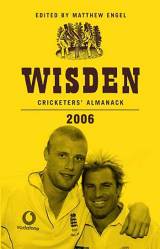Simply the best and biggest
Michael Billngton reviews the 2006 Wisden Cricketers' Almanack
Michael Billington
15-Apr-2006
|
|
 |
While fulfilling its obligations
to world cricket, the euphoric
143rd Wisden is inevitably
dominated by the Ashes. Andrew
Flintoff beats Shane Wane by a
close-shaven head to the annual
title of Leading Cricketer in the
World. And the excellent essays
on the Five Cricketers of the
Year - Matthew Hoggard, Simon
Jones, Brett Lee, Kevin Pietersen
and Ricky Ponting - all shed
retrospective light on the Ashes
series. David Hopps reminds
us that Hoggard by the end of
summer had the best strike-rate of
all of the world's top Test bowlers
in 2005: one wicket every 38 balls.
Paul Hayward, having dubbed
Pietersen "cricket's first rock-star",
also implies that the natural, freeflowing
talent that produced 473
runs in five Tests finally matters
far more than the skunk hairdo
and the celebrity dating.
But what makes this a Wisden
to treasure is that England's
Ashes triumph is viewed from so
many varied perspectives. Simon
Hughes, freed from the Danteesque
gloom of the Channel 4
van, offers 10 cogent reasons
why England won. Intriguingly,
he gives most space to Vaughan's
proactive, as against Ricky
Ponting's inactive, captaincy:
as one of the lucky ones present
on that Trent Bridge Sunday,
I was astonished at the way it
was Warne rather than Ponting
who dictated the tempo, geed up
fellow-players and even seemed
to take responsibility for field placings.
Every single writer, however,
sheds light on the Ashes series
whether from a cricketing,
social or economic viewpoint.
Scyld Berry rightly points to the
fearlessness of the England side,
arguing that, "if they had not been
so young, fresh and unscathed,
England would not have crossed
Niagara without looking down".
Quentin Letts wittily records
the British media's overnight
cricketing frenzy while Malcolm
Knox poignantly reminds us that
Kerry Packer's Nine Network opted
out of showing the series and
that it took until September 10
for the Oz press to work out the
intricacies of reverse swing; and
that was some time before the
players.
But perhaps the mostsignificant article is Roland
Watson's on the economic impact
of the series: cricket equipment
sales went through the roof with
Woodworm alone selling 20,000
bats in the post-September ecstasy.
Out of the Ashes cricket-fever rose
like a phoenix - which reminds
me that Lawrence Booth has a very
funny piece on the pervasiveness
of cricketing clichés.
Of course, there is more to
any Wisden than a single series.
And Engel has done a superb job
in reflecting cricket's multiple
facets. Gideon Haigh - who wins
the Wisden Book of the Year
Award for his Ashes 2005 - has a
fascinating piece on the rise of
the coach from Bob Simpson to
Duncan Fletcher, suggesting it has
been driven by a mixture of team
failure and TV analysis. Osman
Samiuddin illuminatingly shows
how a shared Muslim faith, even
more than the presence of Bob
Woolmer, has helped to unite a habitually fractious Pakistan
side. And the inter-penetration of
cricket and religion is explored
in a particularly fine obituary of
David Sheppard (why cannot the
longer obits be signed?) which
records how in 1954 the then
Archbishop of Canterbury urged
him to defer ordination to bring
"moral decisiveness" back into
English cricket.
Any niggles? Only one actually.
In his characteristically incisive
Editor's Notes (full of exhilarating
ICC-bashing), Engel continues his
assault on the divided aims of
county cricket which last year he
dubbed "increasingly unwatchable
and pointless". Much may be
wrong with the structure of
county cricket where, as Stephen
Fay points out, power is gradually
passing from members and
elected committees to executive
managers. But the Almanack's
own county reports highlight
people like Alastair Cook, Owais
Shah and Monty Panesar who this
winter all graduated smoothly,
even brilliantly, to the national
side. And Robin Martin-Jenkins
has a thoughtful, back-of-the-book
piece knocking on the head Steve
Rixon's warped vision of much
county cricket as a "cesspool of
mediocrity". As England's recent
results show, it is more talent pool
than cesspool.
But one last hurrah. Wisden this
year appears in both its traditional,
chunky, door-stopper size and a
new large-format, special edition.
The former remains portable,
indispensable and ideal for
stuffing in the brief-case. But, for
reading at home, the large-format
edition is a godsend. I found I
could balance it on my knees
and my desk without breaking
either and I pray that a one-off
experiment becomes a permanent
feature. The new Wisden is not
only, for its celebratory analysis
of the Ashes series, one of the best
ever. It is also, in its alternative
format, revolutionary in its easy
readability.